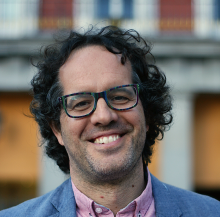
Sergio Tirado Herrero is a Research Fellow of the Institute of Environmental Science and Technology (ICTA) at Universitat Autònoma de Barcelona (UAB) affiliated to the project ‘Empowering women to take action against energy poverty in the Mediterranean’ (EmpowerMed). In 2018-2020 he was a Marie Skłodowska-Curie Fellow at ICTA-UA Band since 2017 co-leads Working Group 3 of the COST Action ‘European Energy Poverty: Agenda Co-Creation and Knowledge Innovation’ (ENGAGER). Prior to that, Sergio has had research associate appointments with fundraising and project management responsibilities at the Centre for Urban Research (CUR) of RMIT University in Melbourne / RMIT Europe Barcelona (2015-2018); at the Human Geography discipline of the University of Manchester (2013-2015); and at the Center for Climate Change and Sustainable Energy Policy (3CSEP) of Central European University in Budapest (2008-2013). He has also had short-term teaching appointments at the UN Economic Commission for Latin American and the Caribbean (ECLAC), the National University of Equatorial Guinea (UNGE), and the National Autonomous University of Nicaragua (UNAN-León).
Sergio holds a PhD in Environmental Science and Policy (Central European University,2013), a post-graduate degree (Diploma de Estudios Avanzados) in Global Change and Sustainable Development (Universidad de Alcalá, 2007), a BSc in Environmental Sciences (Universidad de Alcalá, 2001), and a BA in Social and Cultural Anthropology (Universidad Nacional de Educación a Distancia, 2014).
Research interests
As a socio-environmental scientist Sergio conducts interdisciplinary research on the social, spatial and political dimensions of energy and sustainability transitions. Key areas of interest in his work include energy poverty and vulnerability; environmental and energy justice; climate change, technologies and housing; and collective action and social movements. A main motivation of Sergio’s research is understanding and anticipating inequalities related to processes of socio-technical change driven by environmental concerns. It has a regional focus in Central and Eastern Europe and the Mediterranean as well as an urban emphasis in the understanding that cities are a central site of global transition efforts where struggles over access to energy and other basic amenities are particularly salient.Sergio’s research has received funding from the European Commission,Energy Consumers Australia, the Spanish Ministry of Environment and the Barcelona City Council.
